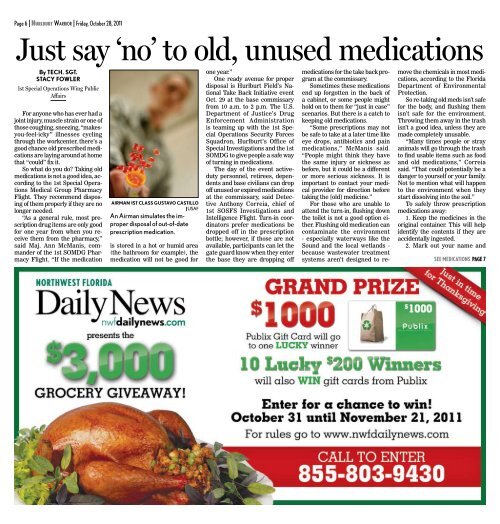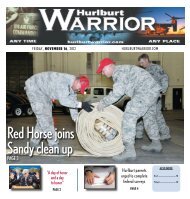doctor leaves private practice to become airman ... - Hurlburt Warrior
doctor leaves private practice to become airman ... - Hurlburt Warrior
doctor leaves private practice to become airman ... - Hurlburt Warrior
Create successful ePaper yourself
Turn your PDF publications into a flip-book with our unique Google optimized e-Paper software.
Page | <strong>Hurlburt</strong> <strong>Warrior</strong> | Friday, Oc<strong>to</strong>ber 28, 2011<br />
Just say ‘no’ <strong>to</strong> old, unused medications<br />
By Tech. Sgt. .<br />
Stacy Fowler<br />
1st Special Operations Wing Public<br />
Affairs<br />
For anyone who has ever had a<br />
joint injury, muscle strain or one of<br />
those coughing, sneezing, “makesyou-feel-icky”<br />
illnesses cycling<br />
through the workcenter, there’s a<br />
good chance old prescribed medications<br />
are laying around at home<br />
that “could” fix it.<br />
So what do you do? Taking old<br />
medications is not a good idea, according<br />
<strong>to</strong> the 1st Special Operations<br />
Medical Group Pharmacy<br />
Flight. They recommend disposing<br />
of them properly if they are no<br />
longer needed.<br />
“As a general rule, most prescription<br />
drug items are only good<br />
for one year from when you receive<br />
them from the pharmacy,”<br />
said Maj. Ann McManis, commander<br />
of the 1st SOMDG Pharmacy<br />
Flight. “If the medication<br />
Airman 1st Class Gustavo Castillo<br />
| USAF<br />
An Airman simulates the improper<br />
disposal of out-of-date<br />
prescription medication.<br />
is s<strong>to</strong>red in a hot or humid area<br />
(the bathroom for example), the<br />
medication will not be good for<br />
one year.”<br />
One ready avenue for proper<br />
disposal is <strong>Hurlburt</strong> Field’s National<br />
Take Back Initiative event<br />
Oct. 29 at the base commissary<br />
from 10 a.m. <strong>to</strong> 2 p.m. The U.S.<br />
Department of Justice’s Drug<br />
Enforcement Administration<br />
is teaming up with the 1st Special<br />
Operations Security Forces<br />
Squadron, <strong>Hurlburt</strong>’s Office of<br />
Special Investigations and the 1st<br />
SOMDG <strong>to</strong> give people a safe way<br />
of turning in medications.<br />
The day of the event activeduty<br />
personnel, retirees, dependents<br />
and base civilians can drop<br />
off unused or expired medications<br />
at the commissary, said Detective<br />
Anthony Correia, chief of<br />
1st SOSFS Investigations and<br />
Intelligence Flight. Turn-in coordina<strong>to</strong>rs<br />
prefer medications be<br />
dropped off in the prescription<br />
bottle; however, if those are not<br />
available, participants can let the<br />
gate guard know when they enter<br />
the base they are dropping off<br />
medications for the take back program<br />
at the commissary.<br />
Sometimes these medications<br />
end up forgotten in the back of<br />
a cabinet, or some people might<br />
hold on <strong>to</strong> them for “just in case”<br />
scenarios. But there is a catch <strong>to</strong><br />
keeping old medications.<br />
“Some prescriptions may not<br />
be safe <strong>to</strong> take at a later time like<br />
eye drops, antibiotics and pain<br />
medications,” McManis said.<br />
“People might think they have<br />
the same injury or sickness as<br />
before, but it could be a different<br />
or more serious sickness. It is<br />
important <strong>to</strong> contact your medical<br />
provider for direction before<br />
taking the [old] medicine.”<br />
For those who are unable <strong>to</strong><br />
attend the turn-in, flushing down<br />
the <strong>to</strong>ilet is not a good option either.<br />
Flushing old medication can<br />
contaminate the environment<br />
- especially waterways like the<br />
Sound and the local wetlands -<br />
because wastewater treatment<br />
systems aren’t designed <strong>to</strong> remove<br />
the chemicals in most medications,<br />
according <strong>to</strong> the Florida<br />
Department of Environmental<br />
Protection.<br />
So re-taking old meds isn’t safe<br />
for the body, and flushing them<br />
isn’t safe for the environment.<br />
Throwing them away in the trash<br />
isn’t a good idea, unless they are<br />
made completely unusable.<br />
“Many times people or stray<br />
animals will go through the trash<br />
<strong>to</strong> find usable items such as food<br />
and old medications,” Correia<br />
said. “That could potentially be a<br />
danger <strong>to</strong> yourself or your family.<br />
Not <strong>to</strong> mention what will happen<br />
<strong>to</strong> the environment when they<br />
start dissolving in<strong>to</strong> the soil.”<br />
To safely throw prescription<br />
medications away:<br />
1. Keep the medicines in the<br />
original container. This will help<br />
identify the contents if they are<br />
accidentally ingested.<br />
2. Mark out your name and<br />
See medications page 7
















